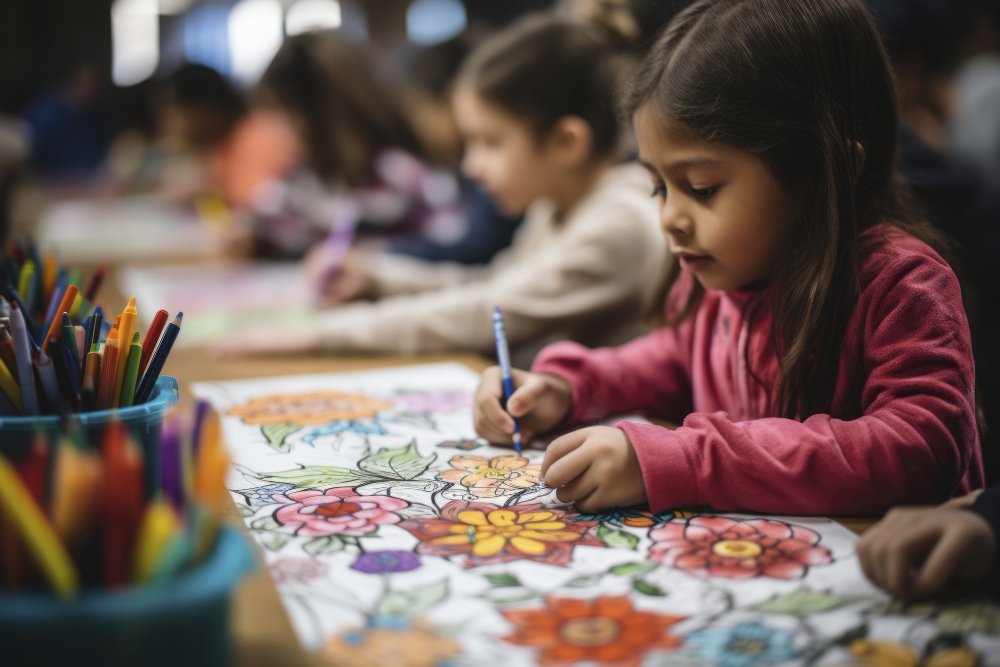
Play based Learning in Preschool
Let’s dive into a topic that’s close to every preschooler’s heart: play-based learning. You might be wondering, why is play so important in those early educational years? Well, let me break it down for you.
The Power of Play
First off, play isn’t just about fun and games (although it definitely includes plenty of that!). It’s actually a critical part of how young kids learn and develop. When children engage in play, whether it’s building with blocks, pretending to be superheroes, or creating artwork, they’re not just passing the time—they’re actively exploring the world around them and building essential skills.
Social Skills and Emotional Development
One big benefit of play-based learning is its impact on social skills. Think about it: when kids play together, they learn to share, take turns, and negotiate. These interactions teach them important lessons in empathy, cooperation, and conflict resolution—all crucial skills they’ll use throughout their lives.
Moreover, play helps children understand and manage their emotions. Through role-playing scenarios or expressing feelings through art, kids learn to recognize and deal with different emotions in a safe and supportive environment.
Fostering Creativity and Imagination
Play also nurtures creativity and imagination. When kids are encouraged to use their imaginations, whether they’re dreaming up fantastical worlds or inventing new games, they’re actually developing problem-solving skills and expanding their creativity. This kind of open-ended play helps them think outside the box and approach challenges with fresh perspectives.
Cognitive Development
Let’s not forget about cognitive development. Play-based activities stimulate brain development by promoting curiosity, discovery, and experimentation. Whether it’s figuring out how to fit puzzle pieces together or exploring cause and effect by building a tower and watching it topple over, these experiences lay the foundation for future learning in math, science, and beyond.
The Joy of Learning
And of course, play is just plain fun! When kids enjoy what they’re doing, they become more engaged and motivated learners. It creates a positive attitude towards learning that can last a lifetime.
How to Support Play-Based Learning
So, if you’re wondering how to support your little one’s development, remember that play-based learning is a powerful tool. Here are some practical tips:
- Provide Time and Space: Allow for unstructured playtime where children can explore and create freely.
- Offer a Variety of Materials: Provide toys, art supplies, and objects that inspire imaginative play and exploration.
- Join In: Play alongside your child and follow their lead. This not only strengthens your bond but also shows them that you value and enjoy their playtime.
- Encourage Outdoor Play: Nature offers a rich environment for exploration and discovery. Encourage outdoor activities like digging in the dirt, collecting leaves, or simply running around.
The world of play-based learning and its significance in preschool education.
Building Essential Life Skills
Play is not just a pastime; it’s a fundamental way for children to develop critical life skills. By engaging in imaginative play, kids learn to communicate effectively, think creatively, and solve problems independently. Whether they’re playing house, building forts, or creating art, they’re honing skills that will serve them well in school and beyond.
Encouraging Curiosity and Exploration
One of the beauties of play-based learning is its ability to nurture curiosity and a thirst for knowledge. When children are given the freedom to explore and experiment through play, they naturally develop a love for learning. Whether they’re investigating the properties of water during water play or conducting “experiments” with mixing colors, they’re engaging in hands-on learning that sparks their natural curiosity.
Tailoring Learning to Individual Needs
Play-based learning allows for individualized instruction that meets each child’s unique developmental needs. In a classroom setting, teachers can observe how children interact with different materials and activities, identifying strengths and areas for growth. This personalized approach helps ensure that every child is challenged and supported appropriately as they progress.
Building Strong Foundations for Literacy and Numeracy
Believe it or not, play is a powerful precursor to academic success. Through play, children develop early literacy and numeracy skills in a fun and engaging way. Activities like storytelling, singing songs, and playing with counting toys all contribute to language development and number sense. These foundational skills form the basis for future academic achievements.
Promoting Physical Health and Well-being
Play-based learning isn’t just about mental development—it’s also crucial for physical health and well-being. Active play, whether it’s climbing on jungle gyms, playing tag, or dancing to music, helps children develop gross motor skills, coordination, and strength. Physical activity is essential for overall health and contributes to a child’s sense of confidence and competence.
Strengthening Relationships and Building Confidence
Last but not least, play fosters positive relationships and builds self-confidence. When children play together, they learn important social skills such as sharing, taking turns, and resolving conflicts peacefully. These interactions lay the groundwork for healthy relationships in the future. Additionally, mastering new skills through play boosts children’s self-esteem and empowers them to take on new challenges with enthusiasm.
Embracing Play-Based Learning at Home
To support play-based learning at home, try incorporating these ideas:
– Create a Playful Environment: Set up designated play areas with toys, books, and art supplies that inspire creativity.
– Follow Your Child’s Lead: Let your child take the lead in playtime activities and join in their imaginative worlds.
– Encourage Pretend Play:Provide dress-up clothes, puppets, and props to encourage imaginative role-playing.
– Explore Nature Together: Take outdoor expeditions to parks, gardens, or nature trails to encourage exploration and discovery.
By incorporating play-based learning both at home and in educational settings, we can give our little ones the best possible start in their educational journey. After all, as Fred Rogers once said, “Play is often talked about as if it were a relief from serious learning. But for children, play is serious learning.” So let’s try out the power of play and watch our preschoolers thrive!
Drop us a line and we’ll be in touch soon!

